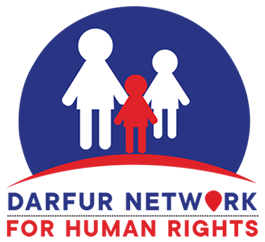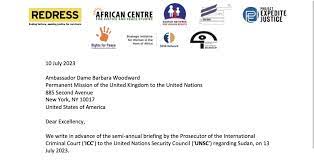10 July 2023
Ambassador Dame Barbara Woodward
Permanent Mission of the United Kingdom to the United Nations
885 Second Avenue
New York, NY 10017
United States of America
Dear Excellency,
We write in advance of the semi-annual briefing by the Prosecutor of the International Criminal Court (‘ICC’) to the United Nations Security Council (‘UNSC’) regarding Sudan, on 13 July 2023.
As you will no doubt be aware, a deadly armed conflict broke out in Sudan on 15 April 2023 between the Sudanese Armed Forces (‘SAF’) and the Rapid Support Forces (‘RSF). The current situation is bleak. Much of the fighting has taken place in residential areas resulting in the killing of civilians, destruction of vital infrastructure, as well as deepening Sudan’s humanitarian crisis. In less than three months, more than 1,500 people have been killed – even by conservative estimates which do not take into account the possible thousands of civilians reportedly killed in West Darfur. Almost 3 million people have been forcibly displaced. An estimated 60% of health facilities in the country are completely non-functional. Mediation efforts have been largely unsuccessful. There is no clear end in sight.
Credible local reports have consistently implicated members from both sides in the commission of possible international crimes since the conflict began, including war crimes, crimes against humanity, and – more recently – genocide. Civilians have been targeted by combatants, particularly doctors, lawyers, journalists, activists, aid workers, and prominent political and community figures. We regularly receive reports of torture, enforced disappearance, sexual violence, and extrajudicial executions being perpetrated by both sides.
History is now being repeated in Darfur. The RSF (formerly, the Janjaweed) are targeting many of the same groups they massacred during the early 2000s, adopting scorched earth tactics in coordination with allied militia groups, destroying hospitals, razing civilian structures, and assaulting/killing non-Arab groups – especially those from the Masalit tribe. Whereas some have managed to flee, many people remain trapped in Darfur due to the lack of humanitarian corridors. Some 900 wounded individuals reported being shot at as they tried to escape from El-Geneina (West Darfur) to Chad. Others have been killed or detained by RSF members at one of the numerous RSF checkpoints en-route. The UN Special Advisor on the Prevention of Genocide, Alice Wairimu Nderitu, has warned that the ongoing violence in West Darfur could “develop into renewed campaigns of rape, murder, and ethnic cleansing amounting to atrocity crimes.”
Historically, the Sudanese authorities have failed to investigate or prosecute international crimes committed in Sudan. Suspected perpetrators – including senior leaders within the RSF and the SAF – have been allowed to act with impunity; and have consistently weaponised the commission of serious human rights violations to tighten their grasp over political power. In this context, the ICC is seen by many in Sudan as a crucial deterrent against future violations, and a symbol of hope that perpetrators will one day be held accountable.
The current conflict has already had serious consequences for the ICC’s work. Last month, the Common Legal Representative for Victims noted in her opening statements at the Ali Kushayb trial (a former Janjaweed commander) that participating victims were being directly impacted by the current conflict and called for the Office of the Prosecutor (the ‘OTP’) to continue investigating ongoing crimes in Darfur. At least one ICC charged person – Ahmed Muhammad Harun, former Minister of State for the Interior and former governor of South and North Kordofan – fled domestic custody in the early stages of the conflict. As of writing, reports suggest that the RSF is now besieging Alia Military Hospital, where another ICC charged person – former president Omar al-Bashir – is believed to be held.
However, the OTP has yet to issue a statement regarding the current situation. While we appreciate that the OTP is very closely monitoring the ongoing conflict, its silence on Sudan lies in stark contrast to its response to the Russian invasion of Ukraine in 2022, when, four days after the invasion began, the OTP announced its intent to open an investigation into both historic and ongoing violations of international law in Ukraine.
UNSC Resolution 1593 (2005) (from which the ICC’s jurisdiction in Sudan is principally derived) referred to the ICC “the situation in Darfur since 1 July 2002”. In the context of a situation referred to it, the ICC has previously considered that it may only investigate crimes committed after that time, “in so far as they are sufficiently linked to the situation of crisis which was ongoing at the time of the referral.” While the OTP is presently considering whether this threshold has been met, our partners in Sudan have expressed serious concern that any investigation launched on this basis may be inadequate to properly address the breadth of ongoing violations. Most obviously, the ICC may consider that its jurisdiction is geographically confined to crimes committed in Darfur. This would be a disastrous outcome for victims, noting the strong links between the lack of accountability for atrocities previously committed in Darfur and the current conflict, and that many international crimes have been committed elsewhere across Sudan (particularly Khartoum).
The cycle of impunity enjoyed by perpetrators of gross human rights violations in Sudan must be halted. The UK government is uniquely placed to lead the way in ensuring that the ICC has the jurisdiction and resources it needs to investigate the current conflict and ensure that those responsible are finally held to account. We therefore urge Your Excellency to take the Prosecutor’s semi-annual briefing as an opportunity to:
call on the OTP to issue a statement regarding the current conflict, including describing the impact of the conflict on the ICC’s ongoing investigation and active Sudan cases, as well as its proposed path forward; and
encourage the UNSC to proactively address any potential limitations in the ICC’s jurisdiction with respect to ongoing international crimes being committed in Sudan, by:
referring the current situation in Sudan to the ICC; or
requesting the rapid establishment of an international commission of inquiry to immediately investigate reports of violations of international humanitarian law and human rights law in Sudan by all parties, to determine whether acts of genocide, crimes against humanity, and war crimes have occurred, and to identify the perpetrators of such violations with a view to ensuring that those responsible are held accountable.
Sincerely,
REDRESS
African Centre for Justice and Peace Studies (ACJPS)
Darfur Network for Human Rights (DNHR)
Gisa Group – Sudan
Project Expedite Justice
Rights for Peace
Strategic Initiative for Women in the Horn of Africa (SIHA) Network
Sudan Human Rights Hub
Sudanese Human Rights Monitor (SHRM)

